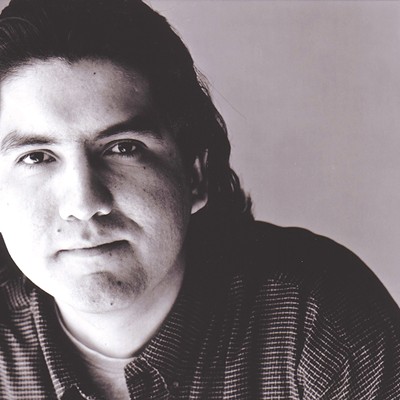In the fight for his political life, Jim West has settled on a simple strategy: deflect attention away from himself onto someone or something even less popular than he is these days. Hello, Spokesman-Review.
While recent polling suggests the strategy may not be working well enough to save his job from voters angry over allegations and revelations printed by the daily newspaper, he has succeeded in turning the recall election into something more than just a referendum on him. The Review's reporting is on the ballot, too.
Ever since the first stories appeared about the mayor's secret life, Steve Smith has been the face of the newspaper's efforts, appearing on national TV and in local forums defending their unusual reporting tactics. West has taken the cue, and along with trumpeting his two-year record, he is blaming Smith for orchestrating an overzealous witch-hunt.
"[Smith] has launched a full-scale attack on the Spokane community and its trusted institutions," West wrote in a somewhat futile letter aimed to raise funds to help him keep his job, "but to what purpose? Are Steven Smith and the Spokesman-Review the ultimate authority in Spokane or is it the people? The choice is ours."
Smith says voters should not be confused by the mayor's strategy. "The mayor has done a very good job of taking what some would call a moral and ethical problem and politicizing it," says Smith. "In the end, the recall is about the mayor. It's not about us."
He's probably right, but we're suckers for a tidy storyline, so we'll take the mayor's bait and frame this debate on his terms. Who is making the more convincing case, Steve Smith or Jim West?
To answer that question, let's start by meeting our contestants.
Who Is Steve Smith?
It was a tough time to be hired as editor of the Spokesman-Review. Morale was low as layoffs were underway back in 2002; Smith replaced Chris Peck, who was blamed for failing to push for tougher coverage of the River Park Square debacle, a creation of the newspaper's owners, the Cowles family. Smith says it wasn't part of his job description, but he took it upon himself to attempt to repair the paper's damaged credibility. Taking on Mayor West certainly fits the bill.
"We had to recover whatever credibility we could from River Park Square, which was in many ways a failure of our newsroom leadership — not our rank and file, but our leadership — to do our job aggressively and well," says Smith. "The message [from] this project and other work we've done this year is that we're not going to recognize sacred cows, and we're going to go where the story takes us."
A native of Portland and Eugene, Smith had a long career already behind him, having worked for chains like Knight-Ridder and Gannett at nine papers in eight cities. In Colorado Springs, he oversaw a redesign that changed the paper's identity from the Gazette to, simply, the G. A few weeks after the redesign, Smith was quietly gone. The Independent, Colorado Springs' weekly, reported in January 2000 that many employees felt the newspaper was weakened under Smith, with dropping circulation (in one of the nation's fastest-growing regions) and veteran reporters replaced by recent grads.
Next stop, Salem — where Smith took the reins of the Statesman-Journal, a Gannett-owned paper. After some trepidation over the stories flowing out of Colorado Springs, the staff came to embrace his nose for news, says reporter Alan Gustafson.
"He was aggressive in terms of pursuing in-depth project reporting," says Gustafson. "He was very interested in pursuing stories about the methamphetamine problem in Salem. I think he has a real good sense of hard-hitting news, and he goes after it hard."
"[Smith] was always a strong supporter of aggressive state government coverage," adds reporter Peter Wong. "I don't think he ever really second-guessed us, in terms of what we chose to cover or not cover."
Wong says he got the sense that Smith left because he felt too constrained by Gannett's notorious sense of thrift — and he's right. Smith says he is very happy to be in Spokane, with local owners invested in the community. No former Review staffers would talk on the record for our story, but the general grumblings (these are former staffers, after all) are that in Spokane, Smith has brought in his own team and fostered a with-him-or-against-him dynamic.
Despite the layoffs, Smith says the Review is well above national averages for papers its size when it comes to staffing levels. He has about 138 full-time equivalents, he says (compared to 161 at Peck's high point). At a similar-sized Gannett paper, he says it would be more like 105.
"My view is that we have given up what works best for newspapers — aggressive watchdog reporting and strong basic community news," Smith says of papers that settle for smaller staffs. "I'm the antithesis of the fluffy features. Nobody can do what we do. The Mayor West coverage was not going to come from any other medium in our community."
In fact, he says the bill for the West stories will likely come to an additional $200,000 — proving the newspaper is willing to invest in stories it deems important.
But just as in Colorado Springs, the Review's circulation continues to decline.
According to Audit Bureau of Circulation numbers and publisher's statements released by ABC, the Review's weekday circulation has dropped from 112,904 as of June 30, 1999, to 93,708 (not including Wednesdays) as of March 31, 2005. Sunday circulation has remained stronger (nearly 125,000 as of March 31, 2005), but has also dropped (by about 5,000 since 1999).
But good journalism may just have a negative correlation to circulation these days, as both the Washington Post and New York Times have experienced marked drops in circulation this year.
Despite those numbers, Smith says the paper's renewed sense of mission has boosted the staff's morale. And he also says the staff recognizes that it has a duty to help the city come through this crisis to a brighter future.
"We tend to tear down institutions," says Smith. "We tend to not be skilled at building them back up. We have to learn how to engage in that half of the equation. We can't always be throwing rocks. We have to help patch things up, too."
And if you think Spokane is just another stop on Smith's tour of America's newsrooms, he says he has finally found a place to call home.
"I will be retiring in 10 years or so and don't aspire to much more," he told an interviewer earlier this year. "I have come to love this community and figure I'll stick around if they'll have me."
Who Is Jim West?
Then there's Jim West, one of the most well-known public figures in all of Washington state. At least we thought we knew him, back before May 5. Turns out, there are two Jim Wests — the public and the private.
"What you see is what you get," he says without a hint of irony.
Really?
There are things we know and things we don't know about West. Among the things that seem genuine is that the mayor is in his dream job. And there's no disputing that this is one tough bastard. He continues to fight off cancer, even as it has forced him back into chemotherapy this year. And he exhibits a Clintonian ability to deal with pressure — simply showing up for work on May 6 offered an impressive display of courage.
But what's behind all that? When such a secret life is revealed, you have to throw out everything you thought you knew. Was the new, happy Jim West, who finally won the office of mayor, a concoction from his political laboratory? Could a pedophile lurk behind all that devotion to the public good? He's quite a bit more complicated than he'll admit.
He will, however, reluctantly share some details of his private self. His life, in fact, has been filled with setbacks, making the possibility of being booted out of office seem just the latest in a long line. As a high school student, he planned to go to WSU to pursue a career in architecture. But his family moved to Reno, so he followed them and enrolled at the University of Nevada there — a school without an architecture program. Poor grades left him open to being drafted for Vietnam, and recruiters convinced him to enlist to be able to choose his branch of service. Four days later, Nixon ended the draft. "Lucky me," West deadpans.
After starting a career in law enforcement, he quit his job, sold his guns, his color TV and even his pickup truck to enter politics. He ran for Spokane County Sheriff, but the retiring sheriff threw his support behind Larry Erickson. "Just hand me my lunch," West recalls thinking. Soon, however, he was off to a career on the Spokane City Council and in the state Legislature.
As for his sexuality, West says he never felt different growing up. In fact, he doesn't think of himself as gay — "I'm asexual more than anything else," he says. "Look at me: I work, I go home, I watch TV, I eat pizza, I drink beer. I used to date [women], not a lot, but some. I've always been busy. Sex was never a big part of my life."
West says he still regrets his marriage to Ginger Marshall ended after four years in 1995. In fact, describing another personal setback, he reveals that a miscarriage put more pressure on the couple and contributed to their divorce. "We had a good marriage, but she wanted to live in Seattle, and she was fixated on her career. The miscarriage was a big trauma."
West claims he was essentially heterosexual up until just after his divorce. "The curiosity thing came after the divorce. I didn't go around having gay encounters at all.
"The Internet is very interesting," West adds. "The very nature of it is fantasy — nothing is real."
In fact, as he and just about everybody else on the planet came to find out, the person you are chatting with may not be who you think he is.
But part of West's inscrutable façade dictates that talk of his confused sexuality turns to ... building permits. "They're up 30 percent," West points out. As he puts it, he's not one to "psychoanalyze myself," so he's quick to steer conversation to more comfortable topics — and more public ones. Lately, he has a penchant for seeing the city's glass as overflowing when it is clearly half-empty in some significant ways. And he peppers his defenses with a plethora of obscure accolades — we're the 60th-brainiest city, the fifth-safest from natural disaster, etc.
Still, the fact that West is willing to discuss personal subjects at all suggests that he realizes how far he needs to go to repair his relationship with voters. He also has apologized for using the city's computer to surf Gay.com, and in a kind of sorry-now-that-I-got-caught moment, he pledged that he will no longer seek dates with young men.
"'Dare to be dull' used to be our motto. We kind of blew that," says West, admitting many of his problems are of his own making.
So he's hoping his tenure as mayor counts for something when people fill out their recall ballots. And if that was all voters were considering, he'd probably be home free.
West has shown an unprecedented degree of political skill (for around here, anyway). He secured passage of a massive road construction plan when the streets were teetering on the brink of oblivion. He found a way to remove the River Park Square albatross from around the city's neck (albeit in an expensive way). And he has blazed a trail to maintaining city services in the face of an ugly budget picture (for two years at least). He's not a straight-A mayor, but by most accounts he's the best we've had for quite a while.
But even though getting the road bond passed was tough, not to mention lifting the levy lid earlier this month, winning this recall is really the longest shot of his life. That's why he's not only challenging the Review's reporting, but he's also reminding people that the city needs a strong mayor.
"The question for voters is whether or not the city is moving in the right direction," says West. "Whether or not public officials are entitled to private lives. I'd ask them not to pass judgment on something that doesn't stand up to scrutiny."
OK, so let's apply a little scrutiny to that coverage, starting with the issue of whether the way the Review reported about Jim West was ethical.
Journalism Ethics
One thing is certain about the Review's methods in reporting on the mayor: They opened up a whole new frontier in the world of journalism. When the newspaper hired a local computer forensic expert (see our story, "Who Is Moto-Brock?") to essentially run a sting operation to detect whether the mayor was using Gay.com to make dates, they showed the Internet to be a powerful tool to use in gathering news. Or is that a tool to misuse?
In his column describing why they chose to hire an outside expert, Smith wrote that, "Under ordinary circumstances, the newspaper would not use a fictional scenario in pursuit of a news story. But the seriousness of the allegations and the need for specific computer forensic skills overrode our general reluctance."
Early reviews of the newspaper's decision were pretty bad. Editor & Publisher, the trade publication for newspapers, polled editors at 10 leading newspapers across the nation; two declined to comment, while eight said the Review went too far.
Regional reactions poured in, too, with Tom Detzel, investigative editor at the Oregonian, saying, "It's a pity they had to undercut the credibility of an otherwise fair and relevant report by setting up a phony identity and luring West into a trap. This is not anything I could ever imagine condoning here. You can't lie to get to the truth, then expect someone to respect or believe your version of the truth."
Smith has said they had to go to the next level to get the story, because if they had simply asked West, he would have denied it and the story would have died. But that explanation is too simple. The question is, if the newspaper had confronted West, reciting all they knew and were preparing for publication, would he have confessed to having been the man behind the screen names Cobra82nd and therightbi-guy? It's not an entirely academic question, because that's actually how it transpired, when reporters Bill Morlin and Karen Dorn Steele questioned West the night before the first stories came out. When he was first asked whether he had been on Gay.com, without any mention of the sting by Moto-Brock, he admitted he had.
Q: Do you recall meeting a man named Dannyboy? ... Do you belong to the Web site Gay.com?
A: I've visited it.
So if all they needed was confirmation of whether that was him, perhaps simply asking would have worked, and they could have avoided what Detzel deemed the undercutting of the credibility of the reporting. Of course, without Moto-Brock, they never would have had the chat transcripts, which provided the reports' real impact.
Academics didn't like the Review's tactics, either. "It's one thing for the police or the FBI to pose as a 17-year-old boy," said Bill Babcock, chairman of the journalism department at Cal State Long Beach. "It's another for a journalist to take on the role of junior G-man and do something that essentially is considered police work."
But there were defenders, too, like Steve Lovelady, a former editor at the Philadelphia Enquirer. "The Spokesman-Review's piece on Mayor Jim West is public service journalism at its best, and editor Steve Smith is to be commended. As for the supposed ethical issues raised by the alarmed chin-strokers in our midst — so what if, as reported by Editor & Publisher, the current editors in Philadelphia, Indianapolis and elsewhere piously declare that they wouldn't have taken the measures that Smith took to make his story airtight? All that tells me is that if Jim West, or any other Internet predator, was mayor of Philadelphia or Indianapolis, he'd probably be home free."
Smith says he still feels good about the decision to hire an undercover computer expert to pose as an 18-year-old.
"Except for the half-dozen [critiques] in the first few days, the response has been almost 100 percent positive," Smith says. "We feel real comfortable where we stand with the profession."
West says Smith is standing by flawed reporting because he has no choice. "Smith came slowly to the story, and once he bit, he bit hard," says West. "And now he has to be right because his professional reputation is on the line."
While critics from outside Spokane focused on the Review's bold choice to go where few newspapers have gone before, locally a few niggling questions have emerged about the finer points of the reporting.
TRANSPARENCY The newspaper has stated on many occasions that it will make its coverage as "transparent" as possible, meaning all transcripts of interviews are published in their entirety. Yet that transparency hasn't translated to revealing the identity of Moto-Brock. And the only person who Robert Galliher has ever talked to is Bill Morlin (which appears to be Galliher's choice). The upshot is that despite all their transparency, nobody gets to independently challenge the newspaper's reporting. As West puts it, he's being investigated like a suspected criminal, without the rights even a criminal is afforded.
"In America, you are entitled to confront your accusers," he says.
Smith points out that West is currently under investigation for abuse of power by the FBI, so he may yet get his day in court. Smith even goes so far as to predict that a grand jury will be empanelled at some point. That means a prosecutor somewhere would have to decide there's enough evidence to support taking that next step toward indictment. The FBI, however, has made no public statements about West's case.
STANDARDS Other critics have pointed out that the Review made a strong statement about not simply taking the word of the young man who had a date with West in the summer of 2004; they needed to independently confirm what he was telling them, thus the hiring of Moto-Brock. Essentially, they were saying they would not report on a conversation between two people. But just a few days into their reporting, that's exactly what they did, when they published West's comments as relayed to them by City Councilwoman Cherie Rodgers. (Rodgers claimed West told her he masturbated in his office; West calls her claims "total bullshit.") No one witnessed that conversation, so it opens the question of what their standards are when it comes to he said/she said situations.
ENDORSEMENT Many have been critical of the newspaper for endorsing Jim West while they were investigating him for past allegations of child sex abuse. Smith appears to be on safe ground when he says the stories weren't ready yet and that the editorial board and the newsroom are kept separate. But there would be equally valid ethical explanations for breaking that wall to protect the city from what they came to believe is such a damaged person. It's only academic at this point, but you have to wonder if the dynamic would have been different if the alternative to West was a friend of the newspaper — say a Jack Geraghty — instead of persistent critic like Tom Grant.
CRUSADING There have been times when Smith has appeared to be stirring up even more anger about the mayor, even though he now says "We don't care which way [the recall] goes." In a widely panned column several weeks after the story broke, he lectured the community for not being sufficiently outraged, even going so far as to apparently suggest local pastors should take up the fight in their churches.
"Are clergy embracing the mayor," Smith wondered, "because this previously and admittedly irreligious politician now has found Jesus and won the Lord's forgiveness?"
He also pushed local educators and business leaders to do more, which raised the question of whether Smith viewed his role as "We report; you decide" or "We report; you damn well better break out the pitchforks and torches."
FALLIBILITY There have also been questions about how willing the Review has been to admit its mistakes, as a good newspaper should, and whether it has overstated its case. During the debacle over the doomed city commission convened to look into the matter, the Review mangled a description of retired Judge Phil Thompson's role in a case involving West — based, apparently, on information provided by noted court watcher Cherie Rodgers. Everybody makes mistakes, but it took the paper more than a week to correct it, and even then only conditionally.
Then at a May KSPS broadcast featuring Smith, he seemed to promise that revelations of a web of evil were imminent. "It's not just the mayor," Smith said. "And we'll be explaining this in more detail, but I've already indicated to you that what you have is the connections among the Catholic Church, the Boy Scouts and the Spokane County Sheriff's Department in the '70s and '80s. Whether Jim West molested kids or not, there were things happening in our community that the community needs to know about, and it goes far beyond the mayor. And that story is — will still be told."
In fact, until last week, Robert Galliher and his allegations of child sex abuse hadn't appeared in the paper since July 31. Smith says that the newspaper's coverage is continuing.
In the end, gauging ethics is a parlor game — the First Amendment gives the press nearly unlimited leeway in how they conduct their business. There will never be a definitive answer on these questions; students in journalism schools will study the case and make up their own minds about what's right and wrong.
But on the more pertinent level, there's no debating that the Review got results — lurid, devastating results. For cruising Gay.com, West got caught — a gotcha moment that will easily go down as among the biggest political stories in state history.
Stymied by the freedom of the press, West continues to stew over the fact that he can't face his accusers, so he plans to fight on, even after the recall, with an invasion-of-privacy lawsuit. "I don't like to sue," he says — followed quickly with a comment that he's contemplating filing against Robert Galliher. "The First Amendment might protect the Spokesman-Review, but it doesn't protect Galliher from defaming me.
"It's a very important principle," West continues. "If the newspaper can do this to me, they can do it to anybody. They can run anybody off."
So that leads to questions about where public life ends and where privacy begins.
Privacy Issues
Did the Spokesman-Review invade Jim West's privacy?
"We did not invade it," says Smith. "We were in conformance with the laws of the land and within the commonly accepted standards as they relate to public officials and to communication on the Internet.
"Politicians are entitled to a private life," Smith continues, "and West enjoyed protection for his private life for many years. News organizations chose not to report on it. But in this case, the mayor is operating from his office on city equipment and on city time, in the pursuit of personal benefit using the trappings of his office. That moves immediately into the arena of public interest."
But attorneys working for West say it may not be quite that simple. Bill Etter says one of the most sacred constructs in American jurisprudence is the right to privacy. (It is not, however, a right specifically guaranteed in the Bill of Rights.) It started with Justice Louis Brandeis, who famously called it "the right to be left alone." Those interpretations of the Constitution have led to all kinds of laws, from protecting medical information to the right to choose whether to end a pregnancy. Much of the debate over the nomination of Judge Samuel Alito to the Supreme Court centers on his views about privacy.
Etter points to the fact that Smith himself admits he felt blocked because Gay.com has firewalls, user agreements and other protections to preserve its users' privacy. And still he decided to create a fictional character to get around all that.
"I'd like to know," says Etter, "what laws were broken by setting up that fictional character?"
There's a tangle of federal and state law governing such operations, and law enforcement officials have more leeway than private citizens. But in general, it's a new frontier, and case law has lagged behind the technology — meaning that cases like West's are needed to clear up the bright lines of what is acceptable and what's not.
As we reported in May, if the mayor were to bring an invasion-of-privacy suit against the newspaper, it may end up hinging upon State of Washington v. Townsend, a case in which the state Supreme Court ruled that e-mail and instant-messaging users imply consent to the recording of their chats and e-mails just by logging on in the first place. The court said there's no reasonable expectation of privacy with those modes of communication.
Some, including attorney Steve Eugster, told us the West case exhibited one key difference, though — that by moving his cyber-conversation with Moto-Brock to the more secure AOL instant messaging platform, the mayor was essentially stating that he didn't waive his right to privacy.
Smith is among those who say there is no expectation of privacy on the Internet: "West will have to create a whole new set of standards and precedents if he wants to prevail."
But Etter says it's no slam-dunk: Gay.com certainly seems to think there should be a degree of privacy, he says.
As with the debate over ethics, this one has no quick answer. In fact, it's the kind of case that might need to go all the way to the Supreme Court to get a final word. Where, someday, a Republican-nominated judge may cast the deciding vote in a case of whether another Republican has a right to privacy on the Internet. That would be some kind of crazy karma.
The Recall
Since there are no easy answers to the questions of ethics or privacy, what about the recall itself? If you were bound to vote only on what the ballot measure says, you would be limiting your decision to, as the ballot puts it in careful terms fought over for months, whether "James E. West used his elected office for personal benefit." Specifically, you'd be deciding about the recall based on whether West used his office to give out unpaid internships in return for a chance at sex.
That's the issue at hand, but as we know from what happened to Gov. Gray Davis in California, voters will have a million reasons for the way they vote on the recall. But on that basic question, there is vigorous debate. Even the state Supreme Court said it was not issuing a finding of fact; they were allowing the citizens to have the final say. West says he only offered Moto-Brock the chance to apply, and he says after an exhaustive search of past interns, the Review could not find anyone who claims to have been given special preference. Smith points to another case as proof of a pattern, that is Ryan Oelrich, who was appointed to the Human Rights Task Force after he says West pursued a relationship with him.
But city voters will be making personal judgments on a range of questions, in large part based on the reporting of the Spokesman-Review, so perhaps framing this as West v. Smith makes sense after all. Was Jim West a pedophile 25 years ago? Smith thinks so. Although nothing has been proven, the charge is a serious one that many are troubled by. There is zero tolerance on the issue of child sex abuse, and any connection to it is devastating — as it should be.
Smith's "Mom Test" — that mainstream parents simply won't approve of his admitted behavior — may be the toughest to overcome. Anybody who reads the transcripts will have a hard time getting those images out of their head.
And sadly enough, for some hopefully small minority, his being gay (or whatever he calls it) will be all they need to know when they vote.
But after all this spilled ink, there is only one public, inappropriate thing (so far) that the mayor has admitted to and apologized for — misusing his city computer to visit Gay.com. Human nature tells us that he will be judged for much more than that.
Still, with another setback looming, our inscrutable mayor seems at peace. "The Spokesman-Review may have saved my life," he says as he touches the needle under his shirt that pumps chemotherapy drugs into his body. "I've got something I want to fight for."
Joel Smith contributed to this report.


























